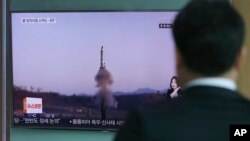U.S. missile attacks against Syria sent a stern warning to North Korea and China that the United States is ready to use military force if necessary, said a senior official from the Obama administration.
President Donald Trump Thursday ordered targeted missile strikes on a Syrian airfield in retaliation for a chemical weapons attack blamed on the Syrian government that killed about 100 civilians. The missile launches coincided with Trump’s first official encounter with Chinese President Xi Jinping in Florida to discuss North Korea, among other things.
North Korean options
Before the meeting at his Mar-a-Largo estate, Trump was reportedly presented with options to respond to the North’s nuclear weapons program including placing U.S. nukes in South Korea or assassinating North Korean leader Kim Jong Un.
“The missile strikes yesterday in Syria do send a message both to China and to North Korea that this administration is prepared to take decisive actions,” said Tony Blinken, former deputy secretary of state, during a phone interview with VOA Friday, “and that may be a valuable message.”
However, whether the U.S. would, in fact, take military action against North Korea is a different story, given the covert nature of Pyongyang’s nuclear and missile programs and its growing weapons capabilities that could cause “tremendous damage in the region,” added Blinken, who also served as deputy national security adviser to former President Barack Obama.
“While I have no doubt that any administration faced with an extremist threat from North Korea to launch a missile with a nuclear warhead on it toward the United States would act decisively to stop that, I think it’s much less likely that any administration including this one would try to use force pre-emptively to destroy North Korea’s nuclear or missile programs,” Blinken said.
US may act alone
In a recent interview with the Financial Times, Trump pledged to curb the regime’s nuclear ambitions alone, if China fails to step up pressure on its North Korean ally.
Asked about whether that is a plausible scenario, Blinken said that although it is “hard to imagine putting meaningful pressure” on North Korea without Beijing, which has significant leverage to exert economic pressure on Pyongyang, there are several unilateral steps available to Trump.
They include placing more missile defenses in the region, having a greater U.S. military presence on the seas, and sanctioning anyone, including Chinese firms and individuals, that does business or facilitates business with the Kim regime.
“Those are the kinds of steps that the United States could take alone or with other countries, that don’t include China, that are directed at North Korea but that China wouldn’t like,” said Blinken, adding if the threat from North Korea continues to grow, “if necessary, those are things that I would recommend doing.”
Fourth missile test
A day before the two-day summit between the leaders of the world’s two most powerful economies, which ended Friday, Pyongyang launched its fourth missile test of the year, in what appeared to be part of an effort to develop a nuclear-tipped missile that could strike the U.S. mainland. U.S. Secretary of State Rex Tillerson responded to the test with an unusually terse statement, saying “the United States has spoken enough about North Korea” and he has “no further comment.”
Blinken noted that North Korea seeks the U.S. response to every single provocation and Washington should not play into the hands of the reclusive regime.
“A more effective response is what we do, not just what we say,” Blinken said. “I can see why (Tillerson) he would rather focus on actions.”
According to Blinken, negotiation is the only way to resolve the North Korean issue eventually and it should be done “when North Korea is prepared to engage in meaningful, authentic and credible discussions about denuclearization.”
But convincing the North Korean leader to negotiate remains a challenge, Blinken added, suggesting the U.S. could try “exerting so much pressure on Kim that he changes his calculus and sees that his best path to survival is actually through negotiations,” while making clear that if the North engages in denuclearization, a peace treaty is certainly possible.
“I think a first step could be getting North Korea to freeze all of its activities — no more nuclear testing, no more missile testing, get inspectors in to verify things,” Blinken said. “That wouldn’t eliminate their existing program … but it would at least stop them from continuing to perfect the program because testing is vitally important to figuring out how to make their missiles better, their nuclear weapons effective and to develop an ICBM that could hit the United States.”
This report originated with VOA's Korean Service.








